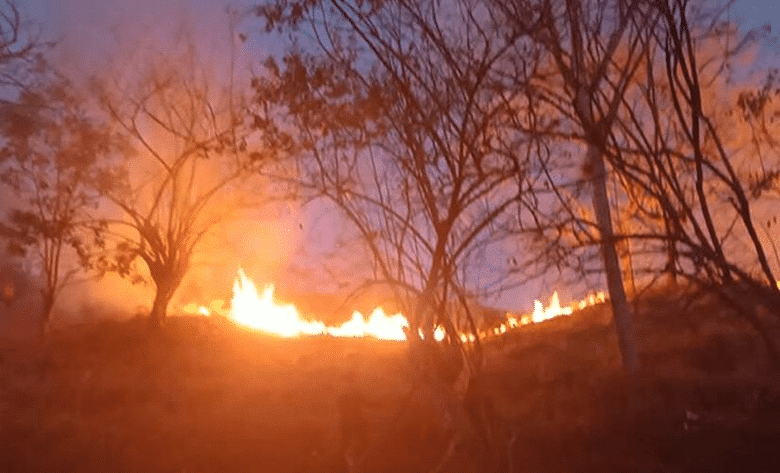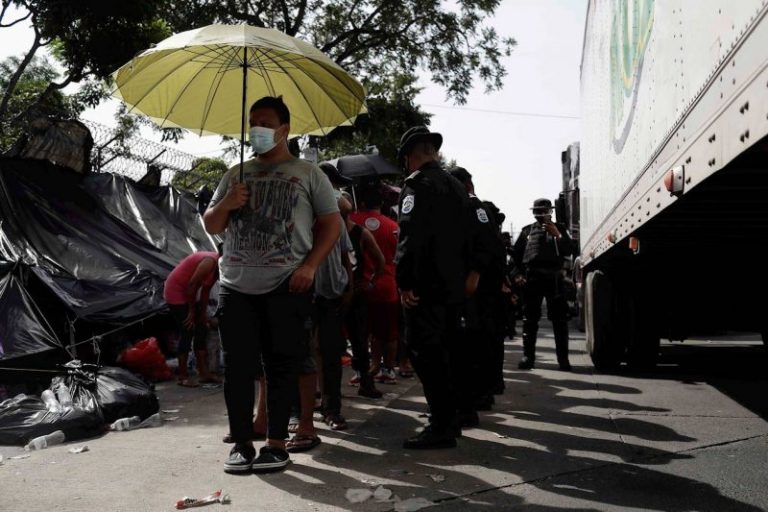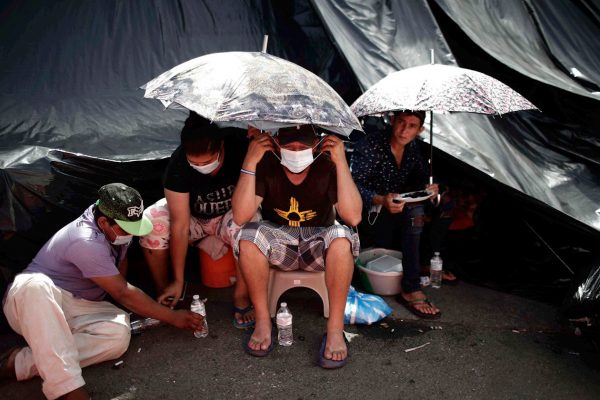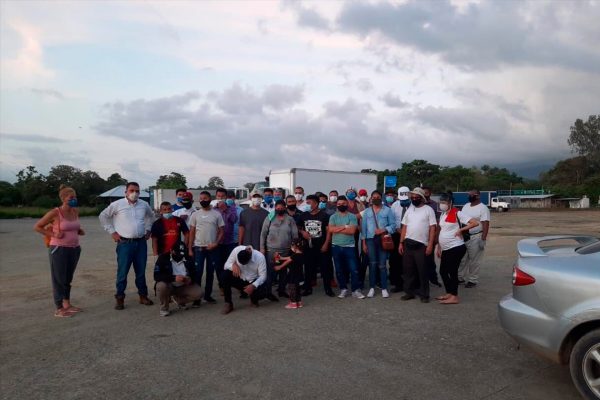9 de agosto 2020

Nicaragua Records 888 Forest Fires So Far in 2024

PUBLICIDAD 1M
PUBLICIDAD 4D
PUBLICIDAD 5D
Over 1,300 Nicaraguan migrants returned home in July. Coming back during a worldwide public health crisis was a lot harder than leaving.

Reaching the United States from Managua took her six hours in an airplane. One year later, when a strange new virus put the world in check, she decided to return to Nicaragua to be with her family. That trip took her 32 days, travelling over 3,290 miles of highway plus eleven days stranded at the border.
This was the journey undertaken by Nicaraguan athlete Sayra Laguna. The story of her return to Nicaragua isn’t unique. Since COVID-19 began spreading, nearly all of the countries of the world opted to keep their residents at home, and to close their borders. At the same time, hundreds of citizens caught outside their own country weighed the prospect of returning to their families. Some because they lost their jobs, and others for fear of being far from those they love in this time of calamity.
In July alone, some 1,300 Nicaraguans arrived back in the country from Panama, Guatemala, Spain and Barbados. Some returned in caravans and others on humanitarian flights, according to the reports from the Interior Ministry and the media.
In order to return, the migrants had to overcome fears of being infected with the virus during the trip, or of being assaulted by gangs, especially in the Northern Triangle of Central America. In addition, they had to put up with great adversity – suffering sun, rain and rejection – for a number of days on the border, in the face of the Nicaraguan authorities’ refusal to let them enter the country unless they could show a negative test for COVID-19. This measure was decreed when many had already begun the journey back home.
The latest migrants to arrive, a group of 148 Nicaraguans, finally entered on August 3rd. They had resisted infrahuman conditions for nearly two weeks at the Penas Blancas post, on the border with Costa Rica. The group were eventually able to demonstrate their disease-free status and finally return home, thanks to COVID-19 tests donated and carried out by an NGO. Daniel Ortega’s government never indicated how they could get tested, since the Nicaraguan government has all the tests centralized in Managua, and don’t ever disclose the number realized nor the results.

Nicaraguan migrants waiting to be allowed entry into their country through the Penas Blancas border station. They were forced to sleep on the ground, sheltered only by black plastic. Photo: EFE
At approximately four pm on Friday, July 24, Lucia [not her real name] arrived at the Penas Blancas border post, together with her husband and son. They were carrying only a few suitcases, since they had sent all their belongings on to Nicaragua weeks before. They had initially planned to leave once they received the results of the COVID-19 tests they had taken in San Jose, Costa Rica, but everything changed when they were evicted from the place they were living. On that Friday, they grabbed their bags and left, thinking that the digital results would be enough to be allowed in. However, when they reached the border, the immigration authorities told them they couldn’t continue, because they needed to show a hard copy of their results. That’s when their torturous ordeal began.
“At that moment, my world crumbled around me. I didn’t want to stay at the border, because I’m a diabetic and I was fearful of getting infected with the virus. I was worried about my fourteen-year-old son; I didn’t know if he would to be able to stand it,” Lucia told us. Now in Nicaragua, she asked to use an assumed name to avoid reprisals.
Despite their fears, the family decided to wait at the border, together with some 500 other migrants. The group was confined to the sides of the highway, and there they awaited some indication of a humane impulse on the part of the Nicaraguan authorities. That never occurred. Instead, for the next eleven days, “Lucia” and her family were the recipients of insults, rejection and threats.
“We were even afraid to speak to the media. We were threatened by those in the riot squad. I cried every night. A lot of people would flee after midnight, and we’d hear shots, we’d hear dogs barking, people yelling. It was torture,” she recalls.
During that time, they slept stretched out on sheets, covered only by some black plastic that had been donated. Conditions were very crowded and unsanitary: they shared one bathroom and had to ration the little water they were given. They didn’t lack for food, because there were NGOs that came to help. But the very difficult conditions began to affect Lucia’s health, little by little. Her feet developed sores and she got a vaginal infection.
By their sixth day on the border, she was so desperate that she thought about crossing illegally. She knew it was risky, but every day she’d hear about migrants who had reached their homes safely after crossing through the brush. With that in mind, she asked the authorities for permission to send their bags on ahead with a cousin who drove a truck. One official told her it wouldn’t be a problem, but the next day, another gave her a flat “no”.
“How do you think you’re going to approach a driver? You’re all infected. You’re all contaminated. What are you thinking? Get away, don’t come near me,” the official responded, in front of everyone.
Having lost the chance to send their luggage, Lucia then opted to remain. There, stranded at the border, she thought about how her life had changed since the pandemic. In January, nearly two years after arriving in Costa Rica as a refugee, she had finally achieved some stability. She had a formal job, she had acquired some household items, and her husband’s work was also going well. But in March, when the pandemic hit, they were both laid off and forced to live on their savings for the next four months.
“I have a house in Nicaragua, so I began to think that going back was the best thing to do. Back home, we weren’t going to be under the pressure of being evicted at any moment from the house we were in, because we couldn’t pay rent,” she reflected.
Even when they told her that she couldn’t cross the border because the test results she had were digital, she thought that it would be only two days before they brought her the hard copy results and she could enter. But when this happened, the authorities then told her that they were no good because more than 72 hours had elapsed from the time of testing. Lucia and her family had no other choice but to remain where they were.
The stranded migrants withstood the terrible conditions right until the final day. Last Sunday, August 2nd, Lucia recalls that a group she hadn’t seen before brought them food. A few hours later, they all came down with diarrhea. Despite seeing them all sick, the Nicaraguan authorities didn’t even pass them water.
“They made fun of us when they saw us standing in line for the bathroom, all doubled over with laughter. They said this was happening because we were a bunch of hungry beggars. ‘How come these bastards don’t die?’ they said. At least on the Costa Rican side, they gave the men permission to go in the brush, so as to leave the bathrooms for the women,” Lucia tells us.
On Monday, they finally got their negative test results and crossed the border. The process was quick: their pictures were taken, they were asked for their addresses and telephone numbers, as is normal, and they were then finally allowed to continue their route. However, a group of 21 migrants was left because their tests gave positive results, even though they had no symptoms.
On the northern border between Nicaragua and Honduras, the panorama is similar. No migrant can enter without showing a negative COVID-19 test. Otherwise, the mistreatment the Nicaraguan authorities show their fellow citizens is the same.

A group of 46 migrants were stranded in Guatemala, because the Nicaraguan government wouldn’t authorize their return to the country. Courtesy photo: Confidencial
It took four days for Sayra Laguna to arrange her return trip to Nicaragua. She knew that the only way to get back to Nicaragua was overland. Due to the pandemic, the flights and boat access have been suspended. After learning that her father had COVID-19 and that her grandmother and great-grandmother were both very sick, she grabbed a bag and packed her clothes. She knew it would be a long trip and that she might have a struggle to get in, but her love for her family was more important.
“I crossed into Mexico from the United States in a big truck. In Tijuana, they gave us the quick test, and two hours later we had the results. With that in hand, I reached Guatemala,” she explains.
Upon entering Guatemala, Sayra joined a Facebook group for migrants wanting to return to Nicaragua. “Nicas stranded in Guatemala” it was called. Sayra didn’t know any of them personally, but she felt that going in a group would be easier, because they’d be able to exert more pressure. That’s where she met Antonio [not his real name], a Nicaraguan who had gone to Guatemala at the beginning of the year to take a vocational course after losing his job. Since March, Antonio had been thinking about returning home to his family, but hadn’t yet managed to do so.
Of the group of migrants, 46 decided not to wait any longer, but to go directly to the border between Guatemala and Honduras at Corintos to try and cross. However, when they arrived, they came up against two obstacles: first, that they needed to present a negative COVID-19 test result; and second they would need a safe-conduct letter from the Nicaraguan authorities, promising to receive them.
“Since March, we’d been asking the embassy for help to be able to return. The Nicaraguan ambassador treated us badly; she told us that we needed to contact Managua. She hung up on our calls, or left us waiting on the line,” Antonio recalls.
The group of 46 migrants, including Sayra and Antonio, settled in some 200 meters from the border line. They lay on the ground, and when it rained, they took shelter under the overhang at a gas station. Every so often they’d receive food from the Red Cross and other people who empathized with them. The owners of the supermarket adjoining the gas station also helped them, giving them ears of corn and yucca to eat, and protecting them.
“Those people were like angels. When we first arrived, we were sleeping under a truck, and going into the brush to take care of our needs. I remember that once a member of the Mara 18 gang arrived and he was demanding some kind of passcode, but the owners of the gas station protected us,” says, Antonio.
After a few days of being stuck on the border, the group received the news that a donor would pay for the tests so that they could be allowed to cross. These, they said, were worth US $130. However, nine of the 46 came out positive.
From that moment on, the doctors said that they couldn’t go near us any longer. It was tough seeing how everyone shooed them away – the police, the soldiers, the truckers. Everybody moved away from them, it was like they were lepers,” Sayra tells us.
The nine migrants who tested positive had gone to Guatemala to study. They were traveling with Antonio’s group, and before deciding to return to Nicaragua they had been in strict quarantine. “They wouldn’t sell food to them. Not even water. I remember that they told me, ‘We’re going to die! Don’t leave us here abandoned,’” says Antonio, who is 30 years old.
The treatment towards the Nicaraguans that tested negative also changed. Now no one wanted to let them use the bathrooms and showers that the truckers used at the border, even though they could pay for the service. And their agony continued, because when they finally got the test results, they still had to wait for Nicaragua to commit to letting them in after passing through Honduras.
“Personally, I had imagined a critical scenario from the time I left the US. There were others, though, that weren’t prepared for that. However, we looked for ways to cheer each other up for brief moments,” Sayra says.
The day before the Nicaraguan government at last issued their permits so they could continue on, the athlete learned that her great-grandmother hadn’t been able to hold on long enough to see her for the last time.
“As they were giving me the letter of approval, she was being buried. I didn’t have time to ask for them to hold off the funeral service for an extra day. I had come back because of her, but now I wouldn’t be able to see her,” Sayda recalls sadly.
After eleven days waiting at the border, the group of Nicaraguans continued their journey home. They arrived in the early morning of July 19th and were transported directly to their homes by the Nicaraguan Interior Ministry. They were advised to remain at home for two weeks, and they phoned them every two days.
In Nicaragua, neither Lucia, nor Antonio nor Sayra know what they’re going to do. They don’t have work, but “something will come along” they all say. The one thing that gives them peace of mind is that after everything they’ve gone through, they’re finally back to face the COVID-19 pandemic with their family.
“What we Nicaraguans went through was painful: we would clean the street, then we’d grab a big plastic bottle and use it as a pillow; then we’d all lie down at the side of the road, even though it was damp. We all lay down close together to keep warm (…) We didn’t have anything to cover ourselves with,” Daniel [not his real name], one of the Nicaraguans stranded at the Penas Blancas border post told Confidencial.
Daniel came to Costa Rica two years ago. His goal was to work and try to improve his parents’ living conditions in the southwestern part of Nicaragua. However, when the pandemic hit Costa Rica, he lost his job as an assistant bricklayer and carpenter.
Unemployment and the urge to embrace his parents caused him to initiate his return to Nicaragua on July 23. Several days before, he wired ahead his savings, only holding on to 2,000 cordobas (US $58) for food on his trip. He never imagined that the immigration authorities in Nicaragua would refuse to let him cross the border until he took a Coronavirus test.
Three days under intense sun and heavy rain, without being able to bathe and without anything to eat, led Daniel to try and cross into Nicaragua via an unmarked border point. In this first attempt, he and a group of eight friends crossed through the brush until the Nicaraguan soldiers caught them and “demanded that they turn back”. Back in Costa Rica, Daniel wondered: Why would those from our country chase us out of our own land?”
Daniel then returned to San Jose, the Costa Rican capital, to get the COVID-19 test. “The day that I made the decision to leave the border, I couldn’t bear my painful feet anymore. My arms were sunburned, my shoes were wet, the socks stuck to my feet and the skin on the instep of my foot had blistered and cracked, so that it was completely raw. It’s been hard to recover,” he comments.
When he received the negative test result, Daniel made his second attempt to return to Nicaragua. This time he communicated with some family members, who were waiting for him on the other side. Together with another group of Nicaraguans, without luggage and with only their documents, they once again went into the brush. For the second time, he was stopped by the Army.
“We began to cry that they shouldn’t send us back. We were there for nearly an hour begging the official. He was very humane. He wanted to help us, and he let us go, thank God. He told us: ‘If everything goes well and you don’t run into any others, you’ll reach the highway.’ We walked for nearly two hours through the brush,” Daniel recalls.
With the economic and health crisis that has engulfed Nicaragua, Daniel has returned to start all over again with nothing. “In Costa Rica, the cost of living is much greater, starting with the cost of paying for a tiny living space. At home, we sell ice, choco-bananas, firewood and tortillas,” he states, then adds after reflecting: “nothing compares with having someone to greet you at home, to being with your family. That’s what fills your heart and gives you the will to keep on struggling.”
Archivado como:
PUBLICIDAD 3M
Confidencial es un diario digital nicaragüense, de formato multimedia, fundado por Carlos F. Chamorro en junio de 1996.
PUBLICIDAD 3D